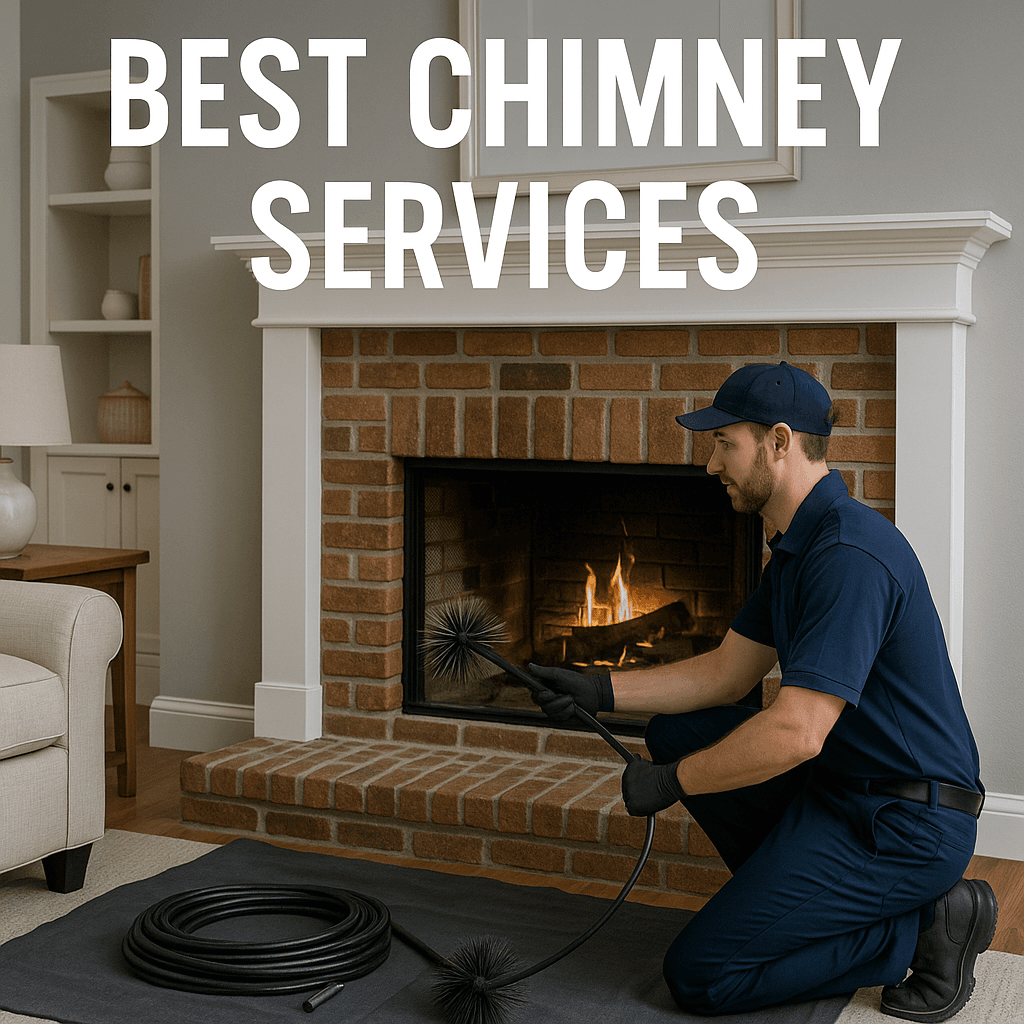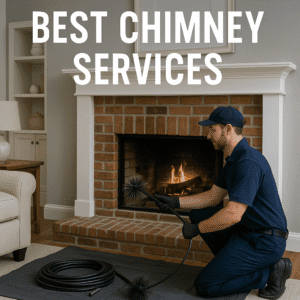How to Find the Best Chimney Services Near You: A Complete Vetting Guide (2025)
Your chimney is more than just a charming architectural feature; it’s a critical component of your home’s heating system and overall safety. Yet, for most homeowners, it’s an “out of sight, out of mind” utility. That is, until something goes wrong. Whether you’re due for an annual inspection or suspect a serious problem, finding a qualified, trustworthy chimney professional can feel like searching for a needle in a haystack.
The industry, unfortunately, has its share of undertrained operators and outright scammers. Choosing the wrong company can lead to shoddy work, unnecessary “repairs,” and a dangerously false sense of security. As a homeowner who has navigated this process for over two decades, I’ve learned that a little bit of knowledge and a solid vetting process are your best defense.
This guide is your roadmap to hiring the best chimney service. We’ll break down the types of services offered, provide a non-negotiable checklist for vetting any company, and show you the red flags to watch out for. Your goal is to keep your chimney safe and functional for your family, not just for a certain holiday visitor—and we all know there are clever ideas for how does Santa get in without a chimney these days anyway!

More Than Just Sweeping: Understanding the Full Scope of Chimney Services
The term “chimney sweep” often conjures up a simple image of brushes and soot. But a modern, certified chimney professional offers a wide range of services crucial for the health and safety of your home. Here’s what a top-tier company can do:
Annual Inspections (The Foundation of Safety)
The National Fire Protection Association (NFPA) Standard 211 states that chimneys should be inspected annually. A certified pro will identify which of the three inspection levels is appropriate for your situation:
- Level 1: A standard visual inspection done during your annual sweep, checking the readily accessible parts of the chimney.
- Level 2: A more in-depth video scan of the flue’s interior. This is required when selling a home, after a chimney fire, or when changing your heating appliance.
- Level 3: The most invasive inspection, which may involve removing parts of the chimney or surrounding walls to investigate a known, serious issue.
During a thorough inspection, a pro will examine every aspect of the structure, even ensuring attachments like the best chimney antenna mount are secure and not causing damage.
Chimney Sweeping (Creosote Removal)
This is the service everyone knows. The primary goal is to remove flammable creosote deposits from the flue liner, smoke chamber, and firebox, drastically reducing the risk of a chimney fire.
Chimney Repair & Restoration
Over time, the masonry and components of your chimney degrade. A full-service company can handle:
- Tuckpointing/Repointing: Replacing old, crumbling mortar joints with the best mortar for chimney applications to ensure structural integrity.
- Crown Repair: Fixing or rebuilding the concrete slab at the top of the chimney that prevents water from seeping into the masonry.
- Flashing Repair: Addressing leaks where the chimney meets the roofline.
- Relining: Installing a new flue liner if the existing one is cracked or damaged. Many homeowners wonder if homeowners insurance covers chimney repair, and this is a critical question to ask your agent when facing these major projects.
Blockage & Animal Removal
Your chimney is an inviting space for critters. Professionals are equipped to safely and humanely remove nests and animals. This is a common issue, and it’s vital to know how to handle it, whether you’re dealing with how to get a raccoon out of your chimney or wondering about the unfortunate reality of how long for a bird stuck in chimney to die if left unattended.
Component Installation
This includes installing or replacing chimney caps (essential for keeping out rain and animals), dampers, and heat shields.
Your 7-Point Checklist for Vetting Any Chimney Professional
Never hire a chimney company without putting them through this rigorous vetting process. A true professional will have no problem providing answers and documentation for every single point.
- CSIA Certification is the Gold Standard The Chimney Safety Institute of America (CSIA) is the country’s leading educational and certification body for the industry. A CSIA-Certified Chimney Sweep has passed rigorous exams on fire codes, standards, and creosote removal. Action Step: Use the CSIA’s official Certified Professional Locator to find qualified sweeps in your zip code. Don’t just take their word for it—verify!
- They Must Have Proof of Insurance This is non-negotiable. The company must carry both General Liability Insurance (to cover any damage to your property) and, just as importantly, Workers’ Compensation Insurance (to cover their employees if they get injured on your property). Without the latter, you could be held liable. Action Step: Ask for a “Certificate of Insurance” and don’t be afraid to call the insurance agency to confirm the policy is active.
- Check Their Local Reputation & References In the digital age, a company’s track record is transparent. Look for consistent, positive reviews across multiple platforms. Action Step: Check Google, Yelp, and the Better Business Bureau (BBB). Ask the company for references from recent customers in your area.
- Demand a Detailed, Written Estimate A professional quote is more than just a number on a business card. It should clearly outline the scope of work, materials to be used, and the total cost. Action Step: For any repair work, get at least two to three written estimates to compare. Be wary of any quote that is dramatically lower or higher than the others.
- They Employ No Scare Tactics or High Pressure A common scam involves a sweep claiming your chimney is on the verge of collapse and requires thousands in immediate repairs. A true professional provides a detailed report (often with video evidence), explains the options, and gives you time to make an informed decision. Action Step: If you feel pressured, thank them for their time and get a second opinion from another CSIA-certified company.
- They Have Professional Equipment & Appearance A reputable company invests in its business. Look for a clearly marked company vehicle, uniformed employees, and modern equipment. For inspections, this means video scanning tools. For cleaning, it means powerful, specialized vacuums. They will use the best chimney sweep vacuum systems with HEPA filters to ensure no soot escapes into your home.
- They are Knowledgeable of Local Building Codes Chimney work is subject to local and national building codes. A professional will be well-versed in these standards and will ensure all repairs and installations are compliant. This is especially important for work involving flue liners and appliance installation.
- Unsolicited Phone Calls or Door-to-Door Offers: Reputable companies are typically booked well in advance and don’t solicit this way.
- “Too Good to Be True” Low Prices: An offer for a “$49 sweep” is often a bait-and-switch tactic to get a salesperson in your home to upsell you on expensive, unnecessary repairs.
- Vague, Verbal-Only Estimates: If they won’t put it in writing, walk away.
- Extreme Urgency: Scare tactics like “Your house could burn down tomorrow!” are designed to bypass your rational judgment. Always get a second opinion for major repairs.
Homeowner Preparedness: Safety Between Professional Visits
While professionals handle the heavy lifting, your role in chimney safety is year-round. Investing in a few key items can make your home safer and help you monitor your fireplace’s performance.

Must-Have Safety: Combination Smoke & CO Detector
Every home with a fireplace MUST have working carbon monoxide detectors. This combination unit provides dual protection against fire and odorless, deadly CO gas. Place detectors on every level of your home and outside sleeping areas.
Check Price on Amazon
For Easy Cleanup: PowerSmith Ash Vacuum
A regular household vacuum can be destroyed by fine ash and is not fire-safe. An ash vacuum with a metal-lined hose and a HEPA filter is specifically designed to safely and cleanly remove cool ashes from your firebox between uses.
Check Price on AmazonFrequently Asked Questions (FAQ)
How much should a chimney sweep cost in 2025?
The national average for a standard Level 1 inspection and sweep is typically between **$175 and $400**. Costs can be higher in major metropolitan areas or for more complex systems like wood stoves with long connector pipes. A Level 2 video inspection usually adds another $150 to $300 to the cost.
Can I sweep my own chimney?
While DIY kits are available, it’s generally not recommended. A homeowner can rarely match the effectiveness of a professional’s tools, and more importantly, DIY cleaning completely misses the most critical part of the service: the professional safety inspection. You can’t see hairline cracks in your flue liner from the bottom.
What’s the best time of year to get my chimney serviced?
The best time is during the off-season in the spring or summer. Chimney companies are extremely busy in the fall as the weather cools down, leading to longer wait times and sometimes higher prices. Schedule in April or May for the best availability.
Do I need to be home for the service?
Yes, it is highly recommended. You will need to let the technician inside. Being present also allows you to ask questions, see any video inspection footage firsthand, and fully understand the report and any recommendations they provide.
Conclusion: Your Partner in Home Safety
Choosing a chimney service is a major decision that directly impacts the safety of your home and family. By treating it with the seriousness it deserves and using the checklist provided, you can filter out the amateurs and find a true professional. Look for that CSIA certification, verify their insurance, check their reputation, and trust your gut. A great chimney professional isn’t just a service provider; they are your long-term partner in maintaining a safe and warm home for years to come.
